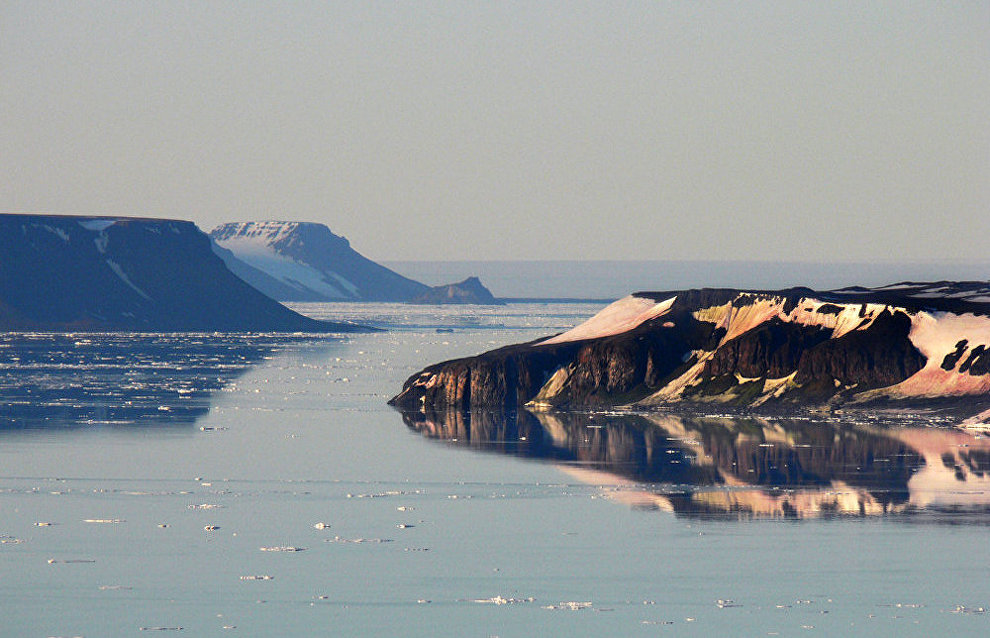Alexander Orlov: Arctic environment takes center stage
This year, the North Pole 2015 expedition took place. How did it proceed and what results were achieved?
The 2015 expedition is a seasonal expedition. It was scheduled to last three months but in reality it drifted for four months. It could have been extended to six months but we failed to come to terms with the Arctic and Antarctic Research Institute. There was a problem with the "availability" of researchers. They were involved in other programs and there were simply not enough to go around.
What are the results of the expedition? This question should be put to researchers. The only thing I can say is that for the first time whales were spotted at the 88th meridian. Biologists documented this fact. The expedition also ascertained that Pacific waters mixed with Atlantic waters. However, researchers are better positioned to speak about this, as I'm only responsible for the expedition's equipment and safety.
All right, then, tell us about safety. Have there been any emergencies?
Safety was ensured 100 percent. Everything proceeded without a hitch. There were no accidents. There was nothing that could have led to force-majeure situations. There is a good saying, "Preparation is half the battle." In other words, we made sound preparations and everything went smoothly. There also were not any problems with the evacuation of expedition members from the station.
What other important expeditions took place this year?
There was an interesting expedition to Shumshu Island, where, in fact, World War II ended. It was the last theater of military operations.
Also, the Vasily Yelagin marine live-ice automobile expedition on Yemelya ATVs, the most challenging expedition, was completed not long ago. The boys moved from Russia via the North Pole to Canada, from Canada to the United States, returned to Russia across the Bering Strait and went to Dudinka down the Yenisei River. It was a fantastic expedition. First, it is exciting; second, it has produced a great deal of new technological discoveries for the Russian motor industry. I believe that this expedition is unique, on par with the descent of the two Mir submersibles on the North Pole.
To what extent are expeditions affected by climate change in the Arctic? Many scientists claim that ice is rapidly melting.
This is a moot point. Personally, I don't see ice melting. I believe this is a cyclical process. The ice cover shrank several years ago and then restored in 2013-2014. The climate has changed, with that I agree. But I wouldn't say that the ice will melt completely in a few years. That's wrong.
I believe that our government and our president did the right thing when they decided to build a large number of icebreakers. In my opinion, they don't believe that the ice will disappear and that no icebreakers will be needed. In other words, they have chosen a path that is very much to our polar explorers' liking. If it's God's will that there should be ice in the Arctic, so be it.
The cleanup operation in the Arctic continued this year. How successful was it?
The work is continuing. There are some question marks about next year, as the economic situation is not great. Regarding the scope of the work, 8,500 metric tons of rubbish are removed from the Arctic each year.
Now the military have also become involved in the effort. That is to say, they not only remove what was brought in but step by step try to remove old rubbish, metal, and so on. This process is moving slowly, but it's moving.
Today, all agencies operating in the Arctic prioritize environmental concerns. In other words, the environment is becoming key to any activity, taking center stage.
By the way, regarding the North Pole 2015 drifting station. As expedition chief, I took a big risk. It took us five days to reach the ice floe aboard the icebreaker. I could have issued an order for the station members to pack up everything. We could have flown there, picked the cargo and left the station. However, I made the decision not to dismantle the station. In other words, the 14 reporters aboard were able to see everything with their own eyes. We reached the station when it was still active. Nobody had to pack up anything. In other words, everything was operational. We dismantled the station in two days, leaving the ice floe in an ideal condition, as it had been before. The reporters captured everything on camera.
There are videos and photos of what it was like and what it became afterwards. I'm pleased with this, and the reporters received a wonderful opportunity to look at the station's operation.
Is there a plan for next year's expeditions?
There are preliminary plans, but they have yet to be approved by the RGS president. One ambitious project is an expedition to Zhokhov Island, including the excavation of an ancient human settlement (8,000 years) in the Arctic. It is the northernmost land in the Arctic. There was a hunters' settlement on the island and we want to start excavating it.
In addition, we want to leave several polar explorers' huts on the island for posterity.
Furthermore, each RGS division has its own ideas. For example, the Kazan division is planning an expedition, including a descent on the North Pole. They plan to set a record, 120 meters, using solely Russian equipment.
